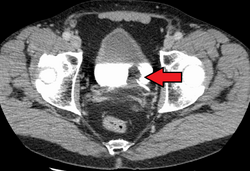
Back Blaaskanker Afrikaans سرطان المثانة Arabic Rak mokraćne bešike BS Càncer de bufeta urinària Catalan Canser y bledren Welsh Blærecancer Danish Blasenkrebs German މަސާނާގެ ކެންސަރު DV Cáncer de vejiga Spanish سرطان مثانه Persian
| Bladder cancer | |
|---|---|
 | |
| Transitional cell carcinoma of the bladder. The white in the bladder is contrast. | |
| Specialty | Oncology, urology |
| Symptoms | Blood in the urine |
| Usual onset | Age 65 or older |
| Types | Non-muscle-invasive bladder cancer (NMIBC), muscle-invasive bladder cancer (MIBC), metastatic bladder cancer |
| Risk factors | Tobacco smoking, exposure to certain toxic chemicals, schistosomiasis infection |
| Diagnostic method | Cystoscopy with tissue biopsy |
| Treatment | Transurethral resection (TURBT), chemotherapy, BCG vaccine, immunotherapy, radical cystectomy, molecular-targeted therapies |
| Prognosis | Five-year survival rates range from 5% to 96% depending on the stage |
| Frequency | Around 500,000 each year |
| Deaths | Around 200,000 each year |
Bladder cancer is the abnormal growth of cells in the bladder. These cells can grow to form a tumor, which eventually spreads, damaging the bladder and other organs. Most people with bladder cancer are diagnosed after noticing blood in their urine. Those suspected of having bladder cancer typically have their bladder inspected by a thin medical camera, a procedure called cystoscopy. Suspected tumors are removed and examined to determine if they are cancerous. Based on how far the tumor has spread, the cancer case is assigned a stage 0 to 4; a higher stage indicates a more widespread and dangerous disease.
Those whose bladder tumors have not spread outside the bladder have the best prognoses. These tumors are typically surgically removed, and the person is treated with chemotherapy or one of several immune-stimulating therapies. Those whose tumors continue to grow, or whose tumors have penetrated the bladder muscle, often have their bladder surgically removed (radical cystectomy). People whose tumors have spread beyond the bladder have the worst prognoses; on average they survive a year from diagnosis. These people are treated with chemotherapy and immune checkpoint inhibitors, followed by enfortumab vedotin.
Around 500,000 people are diagnosed with bladder cancer each year, and 200,000 die of the disease. The risk of bladder cancer increases with age and the average age at diagnosis is 73. Tobacco smoking is the greatest contributor to bladder cancer risk, and causes around half of bladder cancer cases. Exposure to certain toxic chemicals or the tropical bladder infection schistosomiasis also increases the risk.
© MMXXIII Rich X Search. We shall prevail. All rights reserved. Rich X Search